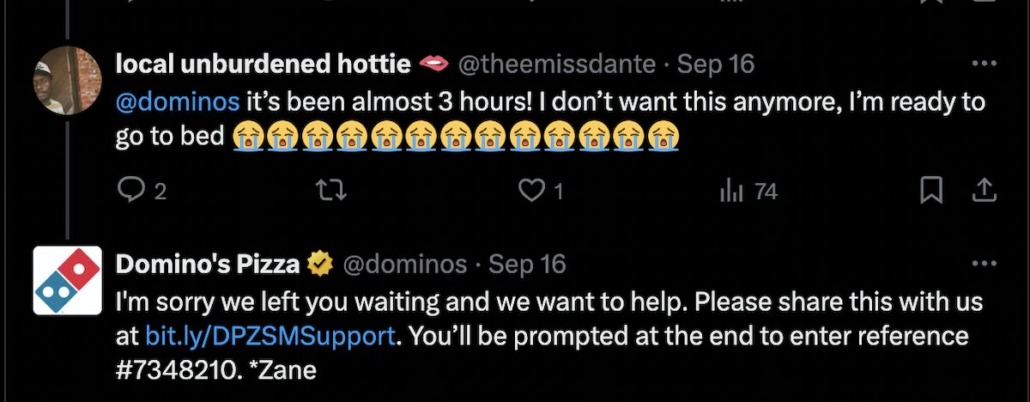The Importance of Social Media Customer Care
It’s no secret that engaging with customers through social media boosts brand visibility, but what about its role in customer service? Many companies provide customer care and support through social media in today’s digital age. Giving customers the option to reach out to you on social media includes customer experience, satisfaction, and real-time convenience. Let’s dive into why offering social media customer care is crucial for businesses today.
The Shift From Traditional to Social Media
Social media has redefined how brands handle customer service questions and complaints. More customers are turning to social media as their first resource for fast and easy responses from brands.
Social media offers immediate, nearly 24/7 interaction from brand to customer for quicker solutions and more satisfied clients. Instead of waiting in queues or listening to hold music, customers can quickly reach a brand through comments, direct messages, or tweets. Contact forms and emails feel impersonal as you don’t know when an actual person will get around to reading your request or where you fall in the line of complaints before you. Social media helps with this burden. Customer care on social media is faster than ever. Responding promptly to customers can boost loyalty with them directly and publicly show other customers who land on your page that you care about customer satisfaction.

Best Practices of Social Media Customer Care
One of the most critical aspects of social media customer care is authenticity. Customers want to feel like they’re interacting with a real person, not just an automated response. Staying consistent with your brand and its values is equally important. Social media allows the flexibility to engage with customers in various ways, but staying true to your brand’s tone ensures long-term loyalty.
Liquid Death Approach
Liquid Death is a canned water brand known for its edgy and bold social media strategy. When responding to customers on social media platforms, they avoid the traditional, polished tone. Instead, they are brutally honest, incorporating humor, sarcasm, and occasional cursing. Thai approach aligns with Liquid Death’s brand voice, making their customers feel unique and providing a more memorable experience.


In these examples, Liquid Death stays true to its brand’s identity. It resonates strongly with their target audience and reinforces authenticity. This approach isn’t for everyone but suits Liquid Death’s rebellious and honest tone.
Domino’s Pizza Approach
In contrast, Domino’s Pizza focuses on its core values of doing the right thing, putting people first, and creating inspired solutions. This is clearly shown in their customer care strategy on social media. Not only do they provide reference numbers to respond to complaints promptly, but they also provide the names of employees assisting customers. This ensures the customer feels seen and heard, knowing they are talking to a real person who wants to sort out issues that arise.

These two brands have different approaches to social media customer care, yet both stay true to their ethos. Domino’s couldn’t engage with customers in the same aggressive style as Liquid Death, just as Liquid Death would not be expected to take on Domino’s more corporate response style.
Benefits of Social Media Customer Care
- Timeliness
Using social media for customer care allows brands to respond in real-time. Customers expect fast responses, especially on social media platforms. Choose accounts you are active on regularly to address inquiries and issues quickly. People feel seen and valued when companies are willing to respond publicly to them, valuing customer feedback.
Automation tools can help handle common questions or complaints, especially during hours outside the traditional work day. This being said, human interaction should still handle more complex issues. Providing a balance between the two is something a brand can consider in its customer care mix.
- Personalization
Tailored responses to customers are essential to building a solid relationship. Generic, automated replies often push customers away and cause frustration due to a lack of personalization. A personalized response strategy makes customers feel valued, and the brand is attentive to addressing specific needs and concerns.
Brands should be prepared to offer support across multiple platforms. These can include Facebook, X, Instagram, and LinkedIn. Be familiar with your audience and demographics and which platforms they are the most active on.
- Monitoring
Tracking messages, comments, and mentions is simple on social media platforms. Using specific tools to track customer interactions, brands can gain valuable insight into customer sentiment and issues that might reoccur. This monitoring allows brands to improve their strategies continuously.
Social media customer care is essential for brands wanting to engage with audiences and provide fast, personalized service. At Bright Age, we specialize in helping brands navigate this care, providing tailored strategies and creative solutions to ensure your business stays connected with its customers.






